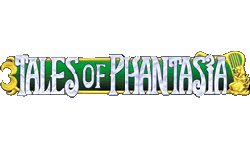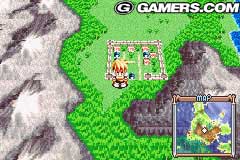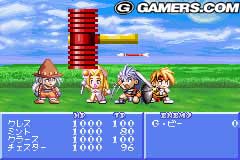|
|

|
BATTLE SYSTEM
|

|
INTERACTION
|

|
ORIGINALITY
|

|
STORY
|

|
MUSIC & SOUND
|

|
VISUALS
|

|
CHALLENGE
|
Unpredictable
|
COMPLETION TIME
|
35-55 hours
|
|
OVERALL
4.0/5
|
Rating definitions
|
|
|
A few years ago (1995) the Super Famicom played host to a title many Japanese players enjoyed quite a bit, along with those who chose to import it. A few years later (1998) the PlayStation got its own version. A little later the Super Famicom version was translated in the nebulous land of ROMs and enjoyed by that audience. In 2003 the same game (mostly) was brought to the Game Boy Advance, and a few years later it was finally given an official English release. Tales of Phantasia may not have been worth holding one's breath for 11 years over, and it has some annoying flaws, but in the GBA's RPG library it is still worth seeking out.
Tales of Phantasia inaugurated the Tales battle system that has since seen much further iteration. As the initiator of this alternative to extant battle systems in 1995, it deserves credit. That does not mean the battles are flawless here. As usual in random encounter oriented titles, the rate of fighting gets annoying and the player will probably get sick of fighting long before a dungeon is complete. Running away from battle is always theoretically possible but in practice can be too difficult because of two issues. One is that, in order to run away, the current player-controlled character must press against a side of the screen and continue pressing in order to fill the run meter and escape. If the random encounter has the player's team surrounded, however, the only way out is through the enemies. Also, if the player's team is outnumbered and/or someone has gone down (the sort of situation that might prompt thoughts of escape), the run meter takes longer to fill.
 Joyce Manning: "Glen was fifty feet tall!"
Joyce Manning: "Glen was fifty feet tall!" |
|
Battle itself is roughly analogous to a fighting game. Cress is almost always the player-controlled character, and he has various techniques that are usable. At any one time the player can use the B button plus a few directional impulses to use four different techniques Cress has available, with the techniques used by button press being changeable after battle. There is also an item that can be acquired late in the game to allow the use of any technique in Cress's arsenal, though they require quick button presses reminiscent of fighting games to pull off. Other than his techniques Cress has a few standard attacks (lunging, jumping slash, repeated slashing, etcetera) that are pulled off with the A button and a few directional presses. Techniques use TP, standard attacks don't. Guarding tends to take place after every attack automatically though with varying success rates.
Cress's allies will be assisting his combat automatically. There are five different setting for how they will assist and these vary depending upon whether the ally is a magic user like Arche or a physical fighter like Chester (with a third set of settings for Mint, the only healer). These settings mostly determine how aggressive the characters will be in their attacking and what targets they will hit first. After or during battle the player can forbid characters from using techniques that are either weak or inappropriate for the current enemies. During battle the player can go into a menu to order allies into using specific techniques/spells on certain adversaries and use items.
Spells require a certain amount of time to cast, and if the caster is interrupted (generally by enemy attack) before the casting is complete it must be begun again. Arche has a certain advantage here by flying on a broom in battles; making many enemy attacks miss her. Enemies that can cast spells are frequently guarded by something in front of them that is hard to move, and until the enemy can be hit by something it can keep casting with impunity.
 ProTip! Those Mystic Symbols that cost so much in shops? Get one (two is better) and your butt will be saved so many times it's hard to count.
ProTip! Those Mystic Symbols that cost so much in shops? Get one (two is better) and your butt will be saved so many times it's hard to count.
|
|
The learning of techniques and spells varies from character to character. Cress learns some techniques automatically, while other techniques called Secret Skills must be bought from persons around the world. Chester and Mint learn their new abilities automatically upon gaining levels, Claus needs to forge a pact in order to summon a new ally, and Arche and Suzu must find new abilities hidden in dungeons.
Battle interaction is a pain at times, thanks to the propensity of allies to like using spells haphazardly. But shop interaction is frequently worse. While the effects of new equipment upon characters can be viewed prior to buying anything, and the effect of using items can be viewed, the windows displaying these effects clutter the screen to a horrific degree. The annoying limit of 15 in any one item that can be carried simultaneously will cause frustration for many. The item list also takes quite awhile to navigate when there are plenty of entries upon it. The interaction isn't terrible, as it is manageable with some acclimatization by the player, but it is very annoying.
Wait, there's a story somewhere around all this combat, isn't there? We begin with Cress and Chester going hunting – and when they come back, their peaceful village has been ransacked by some Bad Guys. Cress runs off and gets bagged by the Bad Guys, he meets Mint who has also been bagged, they escape for a little while, then learn that the head Bad Guy is trying to revive Dhaos the evil king (sealed in a little scene during the prologue). These two get thrown back in time by an ally named Morrison, and must recruit allies to stop Dhaos in both their time and the past. Dhaos has the ability to time-travel however and must be stopped in the future also. The translation is pretty good, with a few inexplicably present spelling and grammar errors being more than balanced by well-written dialogue and fairly amusing NPC comments. There is the odd quirk of no one from the 'present' being in the future when it is reached, even though it is only 50 years hence – given Cress, Mint and Chester's ages, they could easily have still been alive to meet with their younger selves.
Visually the sprites bear little resemblance to the artwork viewable on the status screens, and it's rather off-putting. Other than that quibble the game looks good without looking great; later spell effects are impressive but the GBA can do a little better. Aurally there is a fairly mixed but pretty enjoyable Motoi Sakuraba/ Shinji Tamura work. Also there is English voice acting during battle, and it is mostly pretty bad (I've heard it hundreds of times, but still have NO IDEA what Claus is saying upon victory). Mint is probably the best English performer.
Tales of Phantasia isn't a short game, and the lengthy number of optional things to do can pad the length out quite a bit. There is an optional area to visit in the future that will require numerous hours to deal with, though none of the other options require a commitment bigger than that for any mandatory area. Replay is present; Suzu does not join automatically and must be recruited, plus the game can be saved upon completion for use of earlier data in rounding out lists of things.
Challenge is found in abundance here. If the player is unable to stop an enemy from casting a spell, frequently another chance will not be given and the player will be cast upon repeatedly until death. By the same token, if the player gets the first shot in and can keep enemies from casting, many of them lose their greatest weapon. There are a few enemies that pop up and require immediate attention regardless of this however – petrifying is a danger. Death is a very real possibility in this game, and will be seen by the player barring great luck. One of the more challenging items in Tales of Phantasia results from its heritage however; there is no quick save option. As a player will want to save the game on the spot, this is oft-times a recipe for aggravation. The aforementioned optional dungeon is incredibly irritating for on-the-go gaming, because it will take hours to complete and has but one save point located deep within. This is fine for a console, but not on a portable system.
Tales of Phantasia is a worthwhile play in spite of the irritations and frustrations that will be found within, however. The story isn't superb but manages to hold up adequately, and the rest of the game is a good fit for the GBA. It isn't the top pick on the system by any stretch of the imagination, but neither is it fit to be forgotten.
Review Archives
|









